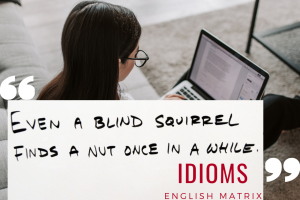Advanced Collocations

The further information on this page may be of interest to advanced students and teachers.
The “father” of collocation is usually considered to be J.R. Firth, a British linguist who died in 1960. It was he that first used the term “collocation” in its linguistic sense.
Some definitions:
- to collocate (verb): to appear with another word more frequently than by chance – The word “white” collocates with “coffee”.
- collocation (noun): the combination of two or more words more frequently than by chance – Learning about collocation helps us speak more fluent English.
- a collocation (noun): an example of collocation – “White coffee” is a collocation.
An easy way to remember the meaning of collocation: think of “co-” (together) and “location” (place) = place together, locate together, go together
Note also (non-linguistic senses):
- collocate (verb): place side by side or in relation
- collocation (noun): the action of placing things side by side or in position
- colocate/co-locate (verb): share a location or facility with someone or something
Strong and weak collocation
If we look deeper into collocations, we find that not only do the words “go together” but there is a degree of predictability in their association. Generally, in any collocation, one word will “call up” another word in the mind of a native speaker. In other words, if I give you one word, you can predict the other word, with varying degrees of success. This predictability is not 100{8d33c80752ac899d888560b1e71891b98ce52ad62842d3c89b49e6349fdc0689}, but it is always much higher than with non-collocates.
The predictability may be strong: for example “auspicious” collocates with very few words, as in:
- auspicious occasion
- auspicious moment
- auspicious event
Or the predictability may be weak: for example, “circuit” collocates with more than 20 words, as in:
| “circuit” collocates left with | “circuit” collocates right with | |
|---|---|---|
| racing | circuit | |
| lecture | circuit | |
| talk-show | circuit | |
| short | circuit | |
| closed | circuit | |
| integrated | circuit | |
| printed | circuit | |
| printed | circuit | board |
| circuit | board | |
| circuit | breaker | |
| circuit | training | |
| circuit | judge |
Lexical and grammatical collocations
A distinction may, if wished, be made between lexical collocations and grammatical collocations.
A lexical collocation is a type of construction where a verb, noun, adjective or adverb forms a predictable connection with another word, as in:
- adverb + adjective: completely satisfied (NOT
downrightsatisfied) - adjective + noun: excruciating pain (NOT excruciating
joy) - noun + verb: lions roar (NOT lions
shout) - verb + noun: commit suicide (NOT
undertakesuicide)
A grammatical collocation is a type of construction where for example a verb or adjective must be followed by a particular preposition, or a noun must be followed by a particular form of the verb, as in:
- verb + preposition: depend on (NOT depend
of) - adjective + preposition: afraid of (NOT afraid
at) - noun + particular form of verb: strength to lift it (not strength
lifting it)
When is a collocation NOT a collocation?
The term “collocation” in its linguistic sense is relatively new (dating from the 1950s) and not all linguists agree on its definition. In fact there is considerable disagreement and even some confusion. Some linguists treat fixed phrases as extended collocations (as far as I’m concerned, not on your life, rather you than me, under the weather, if you’ve got the time). Others suggest that when a sequence of words is 100{8d33c80752ac899d888560b1e71891b98ce52ad62842d3c89b49e6349fdc0689} predictable, and allows absolutely no change except possibly in tense, it is not helpful to treat it as a collocation. Such sequences they generally treat as fixed expressions (“prim and proper”) or idioms (“kick the bucket”).
A good dictionary of collocations is the Oxford Collocations Dictionary for Students of English.

